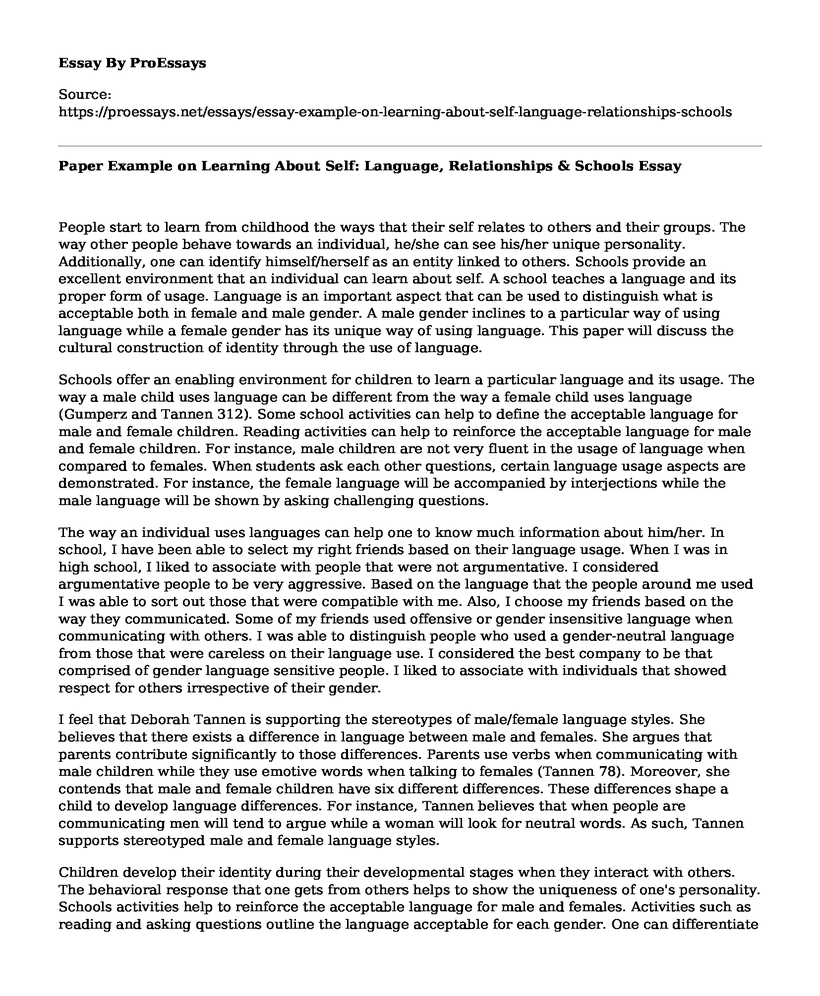People start to learn from childhood the ways that their self relates to others and their groups. The way other people behave towards an individual, he/she can see his/her unique personality. Additionally, one can identify himself/herself as an entity linked to others. Schools provide an excellent environment that an individual can learn about self. A school teaches a language and its proper form of usage. Language is an important aspect that can be used to distinguish what is acceptable both in female and male gender. A male gender inclines to a particular way of using language while a female gender has its unique way of using language. This paper will discuss the cultural construction of identity through the use of language.
Schools offer an enabling environment for children to learn a particular language and its usage. The way a male child uses language can be different from the way a female child uses language (Gumperz and Tannen 312). Some school activities can help to define the acceptable language for male and female children. Reading activities can help to reinforce the acceptable language for male and female children. For instance, male children are not very fluent in the usage of language when compared to females. When students ask each other questions, certain language usage aspects are demonstrated. For instance, the female language will be accompanied by interjections while the male language will be shown by asking challenging questions.
The way an individual uses languages can help one to know much information about him/her. In school, I have been able to select my right friends based on their language usage. When I was in high school, I liked to associate with people that were not argumentative. I considered argumentative people to be very aggressive. Based on the language that the people around me used I was able to sort out those that were compatible with me. Also, I choose my friends based on the way they communicated. Some of my friends used offensive or gender insensitive language when communicating with others. I was able to distinguish people who used a gender-neutral language from those that were careless on their language use. I considered the best company to be that comprised of gender language sensitive people. I liked to associate with individuals that showed respect for others irrespective of their gender.
I feel that Deborah Tannen is supporting the stereotypes of male/female language styles. She believes that there exists a difference in language between male and females. She argues that parents contribute significantly to those differences. Parents use verbs when communicating with male children while they use emotive words when talking to females (Tannen 78). Moreover, she contends that male and female children have six different differences. These differences shape a child to develop language differences. For instance, Tannen believes that when people are communicating men will tend to argue while a woman will look for neutral words. As such, Tannen supports stereotyped male and female language styles.
Children develop their identity during their developmental stages when they interact with others. The behavioral response that one gets from others helps to show the uniqueness of one's personality. Schools activities help to reinforce the acceptable language for male and females. Activities such as reading and asking questions outline the language acceptable for each gender. One can differentiate friends based on their language usage. Tannen upholds the idea of stereotypes in male and female language styles by asserting that she believes in the existence of differences in the male and female language styles. People should learn about the correct usage of language so that they can fit in their gender.
Works cited
Gumperz, John J., and Tannen Deborah. "Individual and social differences in language use." Individual differences in language ability and language behavior. Academic Press, 1979. 305-325.
Tannen, Deborah, ed. Gender and conversational interaction. Oxford, Oxford University Press, 1993.
Cite this page
Paper Example on Learning About Self: Language, Relationships & Schools. (2022, Dec 27). Retrieved from https://proessays.net/essays/essay-example-on-learning-about-self-language-relationships-schools
If you are the original author of this essay and no longer wish to have it published on the ProEssays website, please click below to request its removal:
- Is it Ethical to Engage in Office Gossip? HRM Essay Example
- Why Service to Community/Country Is Important to Me
- Stress and its Effects on Young People Today: Annotated Bibliography
- Women in Movies Essay Example
- Literary Analysis Essay on Crime and Mental Illness
- Essay Example on Anger Management: A Case Study on Treatment Process
- Research Paper on The Effects of Conformity







